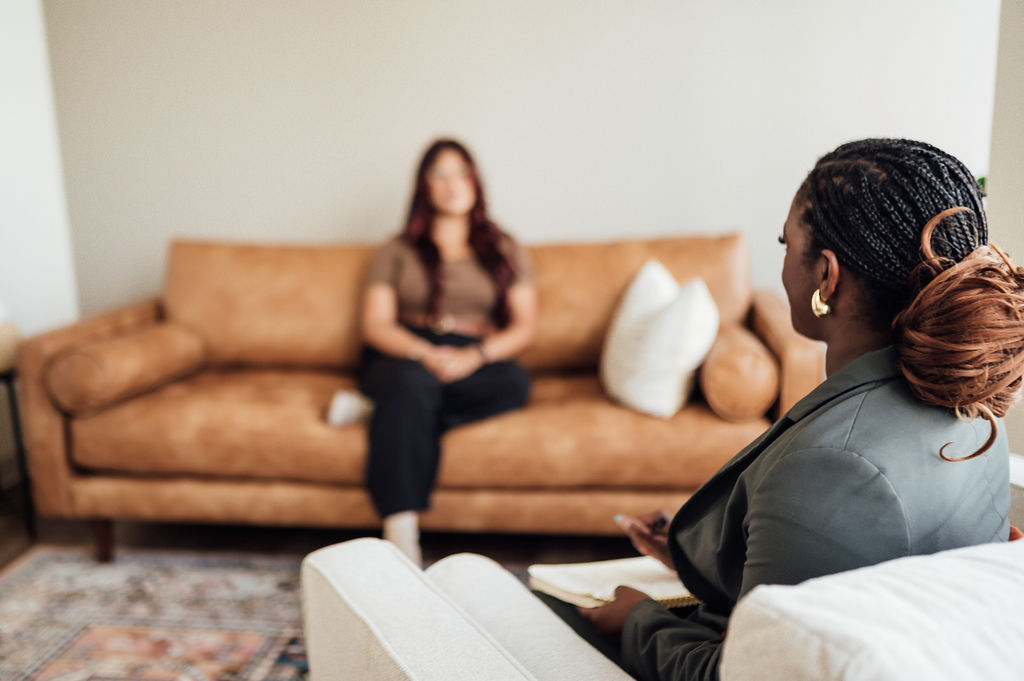Did you know roughly 40 million Americans experience anxiety each year? That’s about 1 in 10 of us, so you’re not alone if you experience it too. At Destination Therapy, our therapy for anxiety can help you free yourself and live a life of confidence and ease.
First off, let me ask you…
- Does your anxiety interfere with your ability to function?
- Do you sometimes lose control of your responses when your anxiety is triggered?
- Do you have uncontrollable thoughts that worry you and wear you down?
- Do you often experience dry mouth, sweaty palms, fluttering heart, or shortness of breath?
If you answered “yes” to any of these, you may be experiencing anxiety in one of its many forms (more on that below). But first…

What is Anxiety?
To start, anxiety is an emotion and often a normal response to situations that we experience. Often, anxiety can be experienced in what may be described as an “appropriate” amount given the circumstances. For example, anxiety after a traumatic car accident would be considered an appropriate response. On the other hand, having anxiety while socializing with close friends in a safe and comfortable setting may be viewed as less appropriate. Regardless of the situation, anxiety can be very difficult to experience and working with a therapist can help.
The APA describes a person with an anxiety disorder as “having recurring intrusive thoughts or concerns.” Once anxiety interferes with daily function, a diagnosis may be appropriate. This is where working with a therapist can help you better understand symptoms and ways of coping.
What are Different Types of Anxiety?
Anxiety can fall into a few categories.
The most common type is called Generalized Anxiety Disorder (GAD). People experiencing GAD report anxious thoughts about everyday life topics. Whether money, family, work, health or another topic, the anxious thoughts persist more days than not, for at least 6 months.
Another type of anxiety is called Panic Disorder. People experiencing panic disorder report “sudden, repeated periods of intense fear when there is no danger.” There can be discomfort, as well as a sense of impending doom and fear of losing control.
Next, there is what’s known as a Phobia. This is intense fear about something specific, like spiders, flying, or swimming. People experiencing a phobia may go out of their way to avoid the thing they fear.
Agoraphobia is the fear of being in situations where escape might be hard or embarrassing. Or when help might not be available in the event of panic symptoms. A trained therapist can help you see if you have this type of anxiety.
Lastly, there is Social Anxiety. Some signs include intense fear of public speaking, fear of eating/drinking in public, and fear of social mingling. People experiencing social anxiety can have strong anxiety and discomfort about being embarrassed, rejected or looked down on by others. No wonder so many people seek therapy for anxiety.
These are the most common types of anxiety. So, what are some signs and symptoms of anxiety?

What are 5 Symptoms of Those Seeking Therapy for Anxiety?
While there are numerous symptoms of anxiety, there are some that are more common than others. Here are 5 common symptoms of anxiety:
1. Sleeping issues, insomnia, or being easily fatigued
2. Inability to get still or calm oneself
3. Feeling restless and on edge
4. Feeling tense or irritable
5. Difficulty concentrating or functioning like normal
Your symptoms may or may not be the same. As always, it’s best to consult a professional for a diagnosis and therapy.
What Does Anxiety Feel Like?
Physically, anxiety has a long list of symptoms. Everyone will have different symptoms and different degrees of intensity. Those experiencing anxiety may relate to a few from this list:
- Restless muscles
- Pounding or rapid heartbeat
- Unexplained aches and pains
- Dizziness
- Shortness of breath
- Cold sweats
- Sweaty palms
- Blushing
- Trembling
- Stomachaches
- Rigid posture
- Overly soft voice
- Difficulty with eye contact and being around unknown people
- Feeling self-conscious
What is the Main Cause of Anxiety?
While there is no widely accepted cause of anxiety, there are a few risk factors. These include traumatic events in childhood or adulthood, personality traits like being shy or withdrawn in new situations, a family history of anxiety or other mental health challenges, and some physical conditions like arrhythmia or thyroid problems. It’s important to be seen by your physician regularly. They can rule out medical issues that may be contributing to how you feel, so staying on top of your medical care is advised. Remember to schedule and attend your annual physical exam!
It’s been found that women experience anxiety more frequently than men. The cause is unclear for now, but luckily there are effective treatments for all genders. More on that later…
When is Anxiety a Problem?
Anxiety can be a problem if:
- It interferes with your work or personal life
- You have suicidal impulses (if so, seek immediate help by calling 988 from a phone or landline)
- Your fear or worry is hard to control and is upsetting to you
- You think it may be related to another mental health problem
- Along with anxiety, you have been drinking more often or dealing with substance use issues or other mental health challenges
So, with all this said, you may be wondering how to free yourself from this burdensome anxiety, worry and fear…
How Does Therapy for Anxiety Work?
Luckily, there are a few tested ways to resolve or reduce your anxiety.
For one, there’s Cognitive Behavioral Therapy (CBT). A therapist trained in CBT will help you find and challenge thought patterns that lead to anxiety. They will help you uproot anxiety-causing beliefs and may offer you exposure therapy.
Your therapist may also provide psychodynamic therapy. This is a great way to explore key themes and perhaps reflect on experiences from your past that may be impacting your anxiety, relationships and functioning today.
Along with an array of therapy approaches, there is also medication. While no medication is known to eliminate anxiety, there are a few that can reduce the severity of it. So, medication may aid in your therapy and serve as another helpful tool in your toolbox of recovery. Medication management from a prescriber may also support your returning to baseline, where skills and tools learned in therapy may be more effective.
Speaking of therapy…
How Can Destination Therapy Help You with Anxiety?
Destination Therapy can help in these areas:
- Diagnosing your specific form(s) of anxiety
- Charting a path back to peace and confidence
- Uprooting the causes of your anxiety during treatment
- Getting immediate relief with someone who really listens to you
- Discussing whether medication may be beneficial for you and for how long
- Processing traumatic events that may have left you feeling anxious
- Giving you tools you can use at home, at work, or in public to ease your anxiety
- Stepping into the next chapter of your life with a better understanding of your experiences and a strategy for moving forward with confidence
And more.
Imagine Your life Without Anxiety
So, if you’re ready to experience relief from worry and fear, sleep more soundly, calm down your nervous system, and function at a higher level…
If you want to regain control of your life and be present for your family, friends, and your work… Our therapists can help you.
To find out if we’re a good fit for each other, click here to schedule a 15-minute consultation call or “get in touch” to submit a contact form.
–Monique Dunn, Founder, Destination Therapy
P.S. For more immediate relief, call us at (346) 266-2912. We’re here to help you overcome your anxiety and move towards a place of healing Monday through Friday, 9am – 5pm. Call now.

